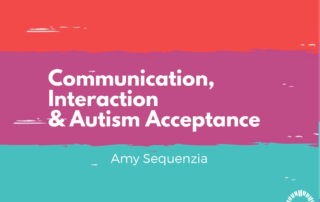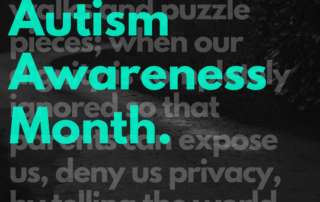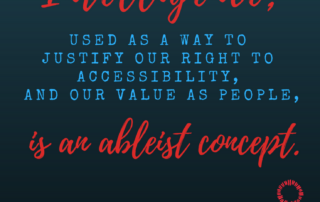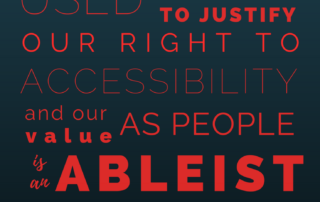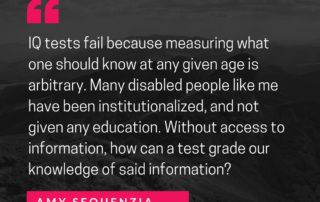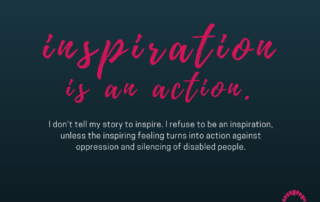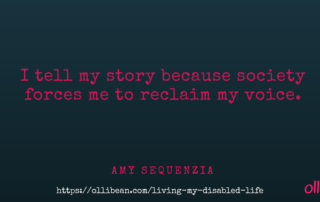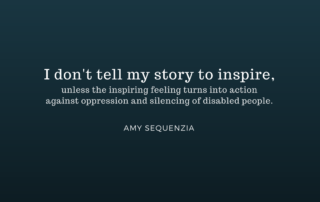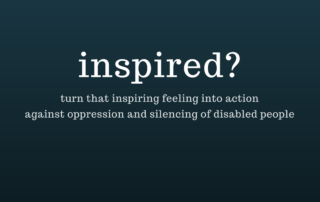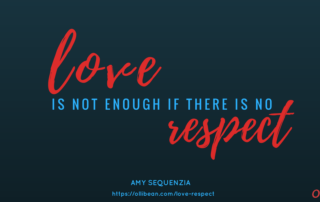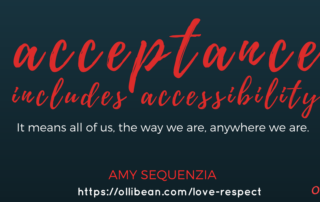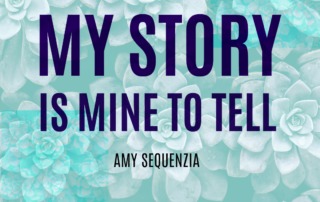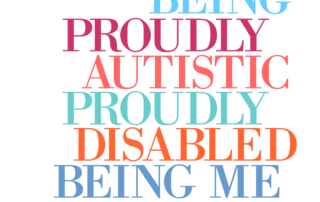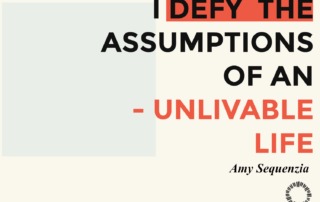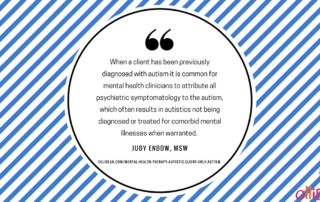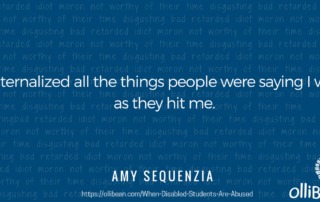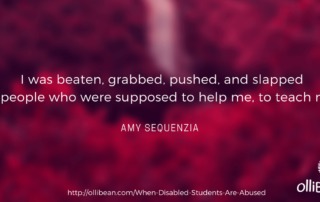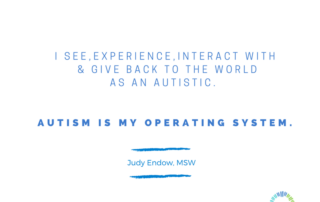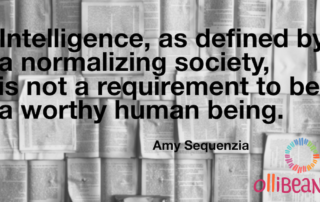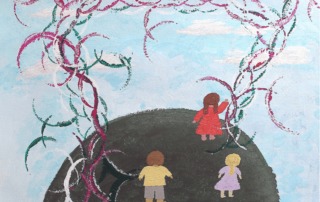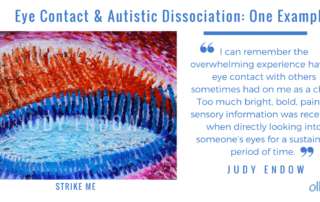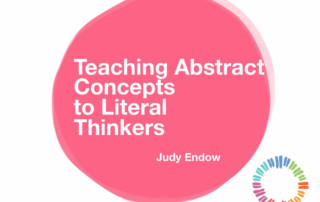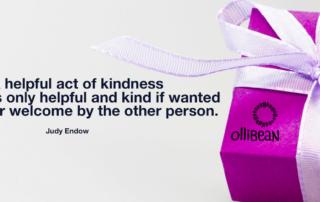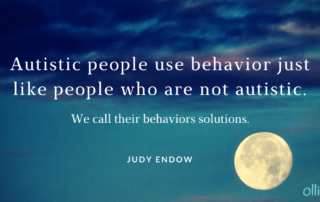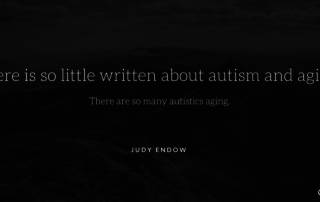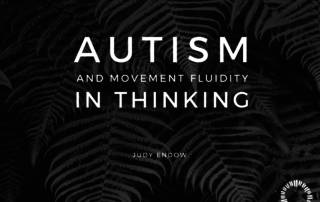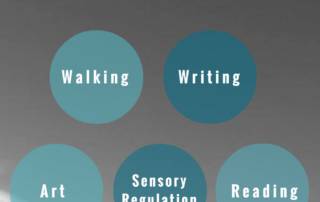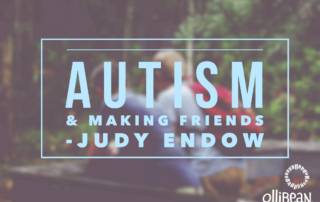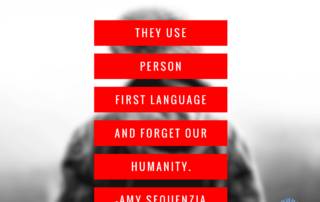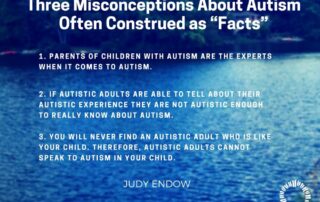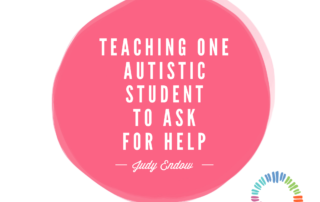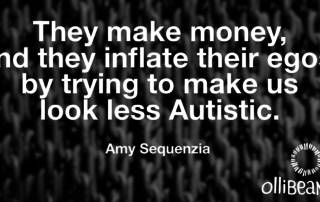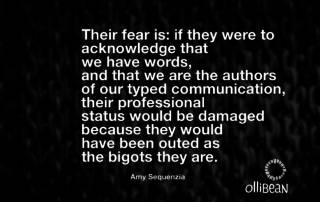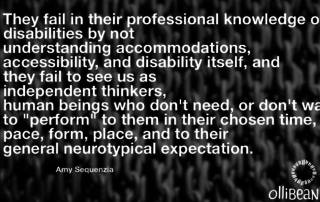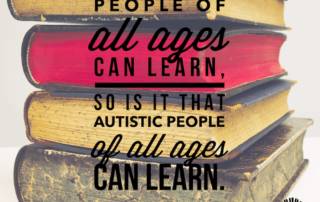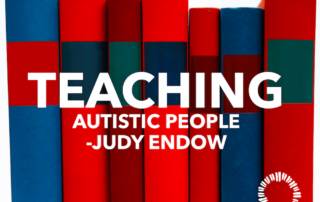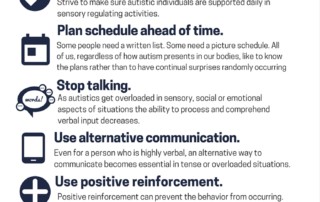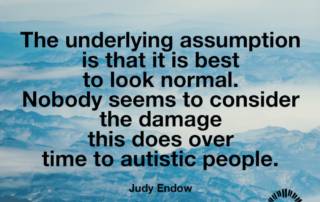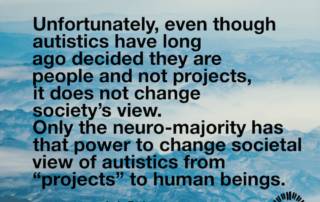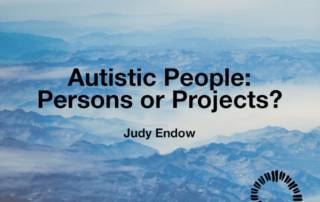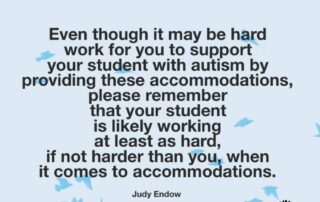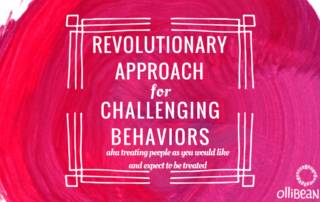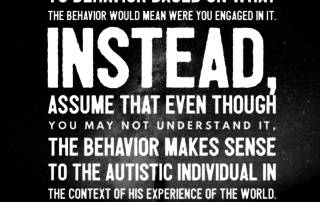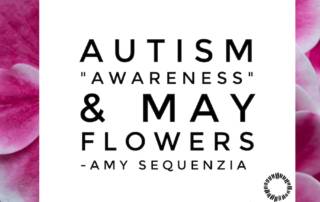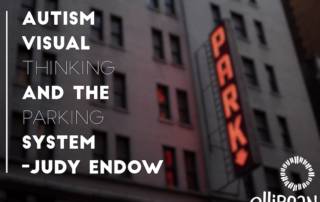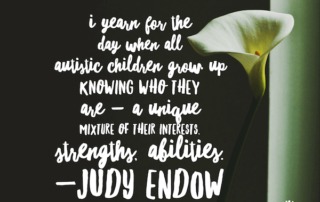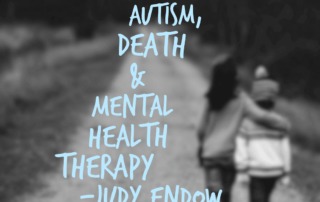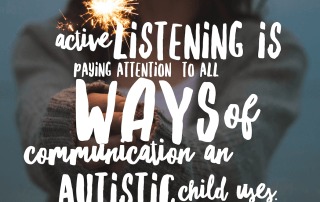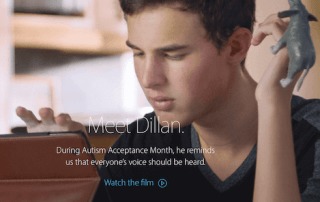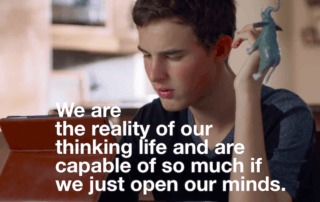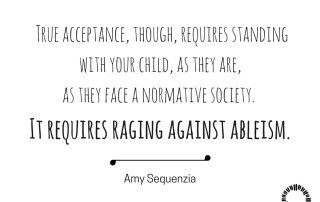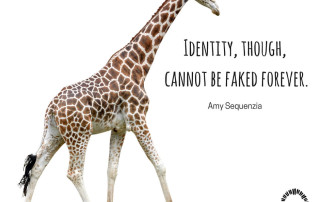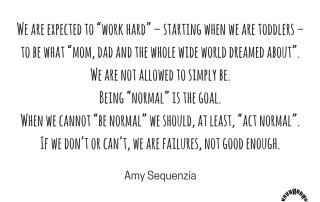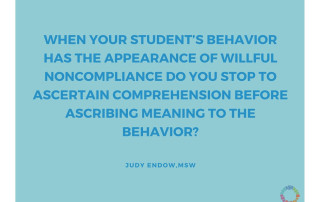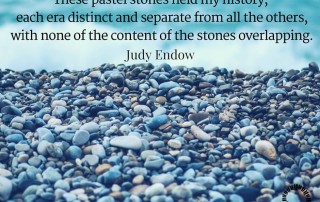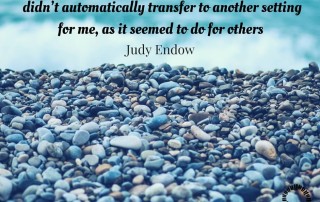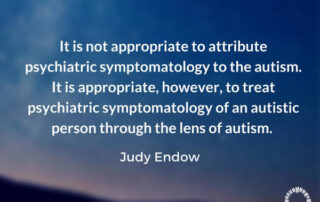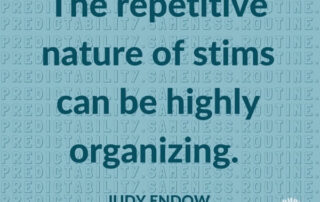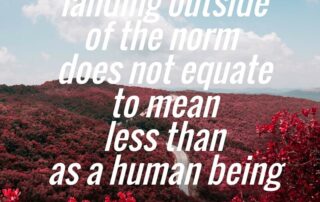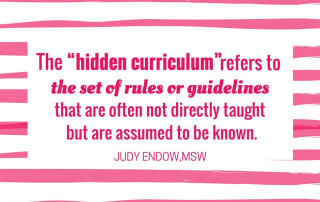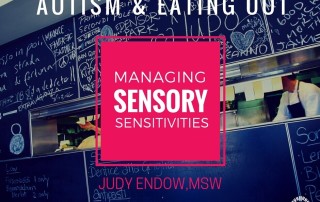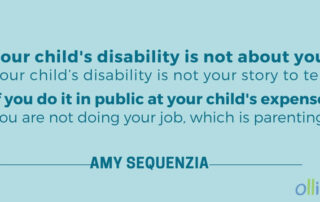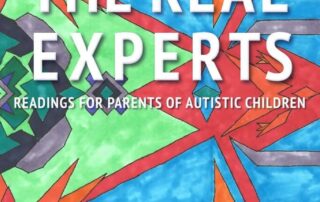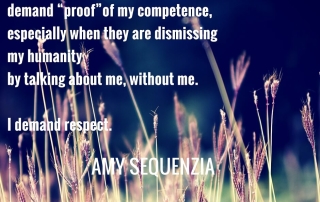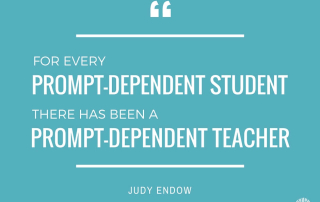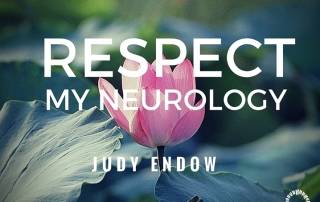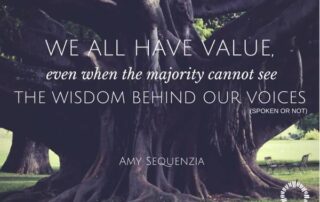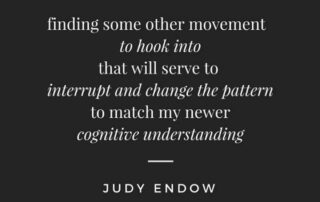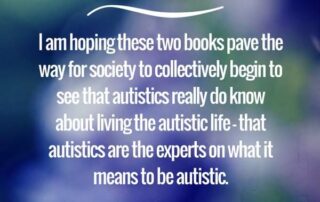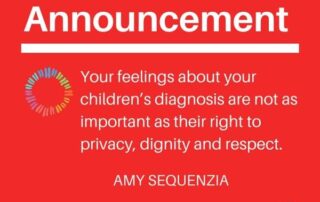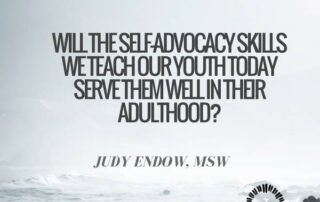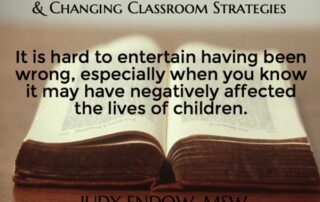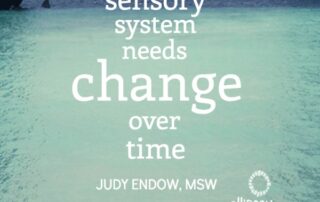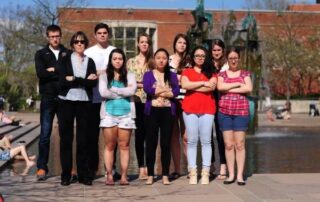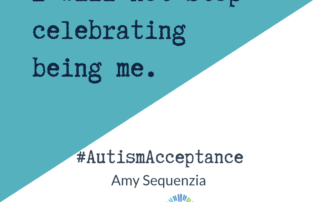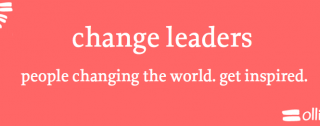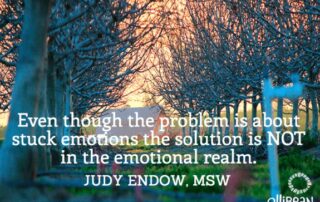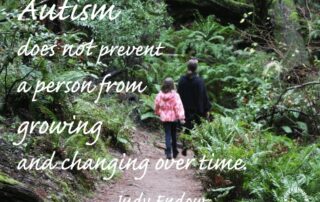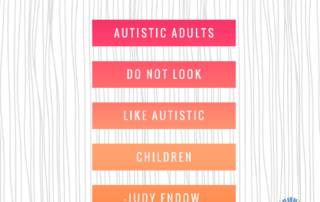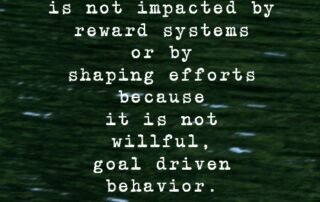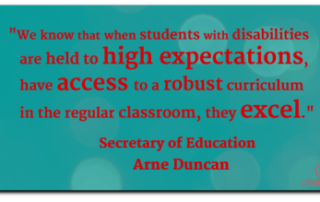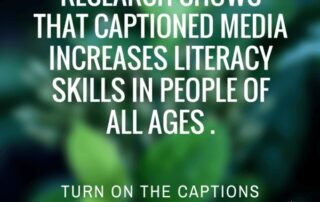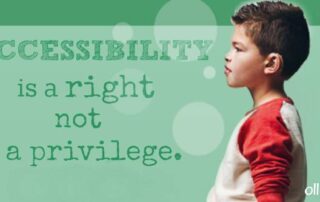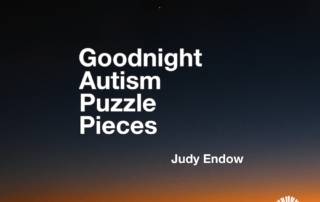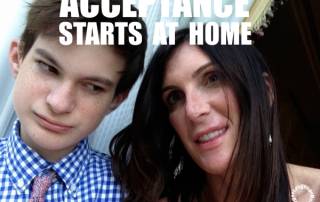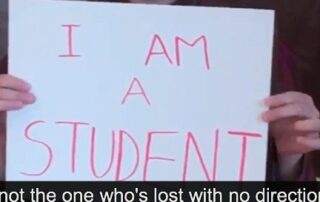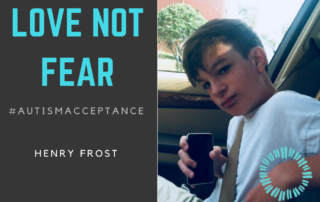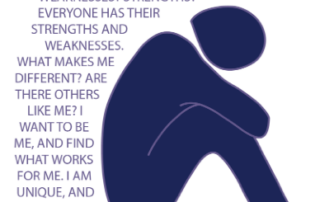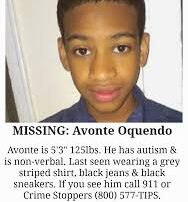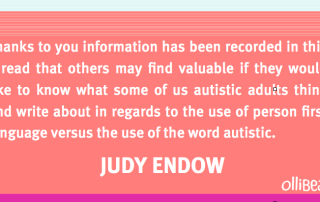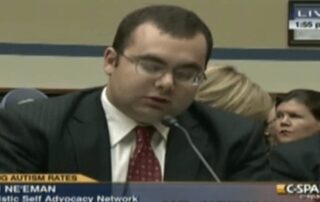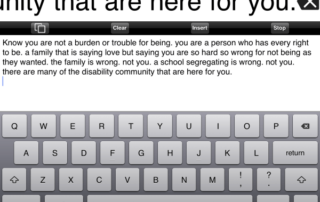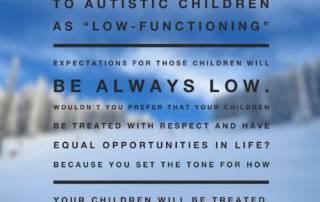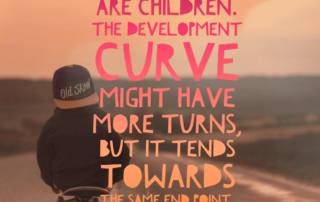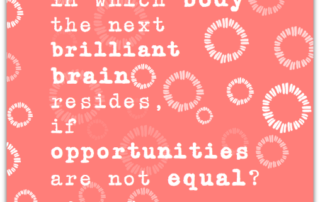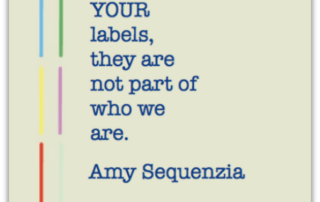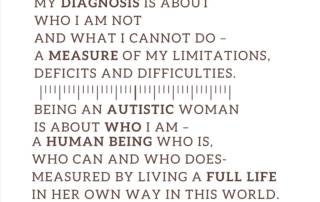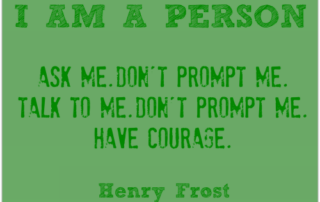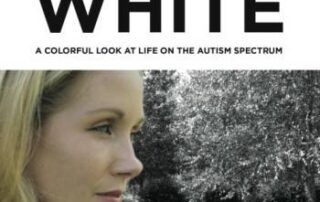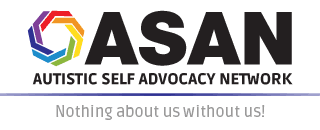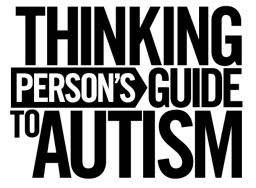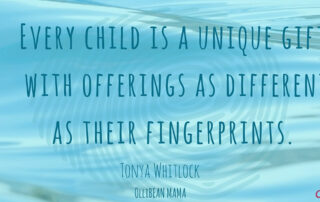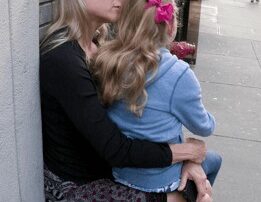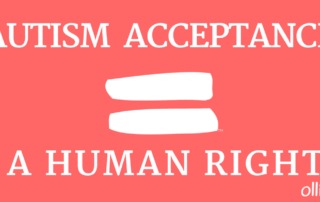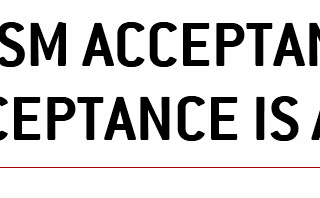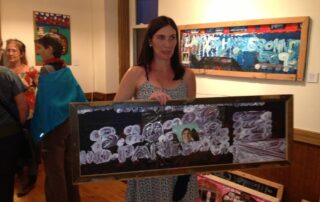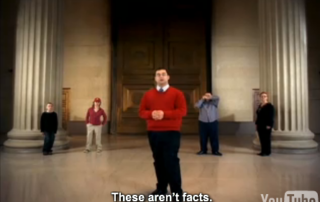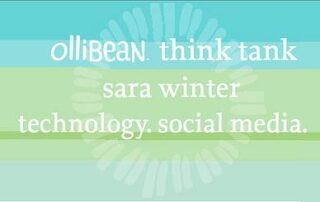Communication, Interaction, and Autism Acceptance
If you've read enough of my writings, you know that I am an activist for the rights of all people - especially Autistic people - to communicate using whatever method it works for each individual. Communication and Autism Acceptance Everybody communicates. Communication doesn't need spoken words. Communication doesn't need words at all. Behavior is communication. Smiles, looks, our bodies - those are used for communication and they are as valid as any word. I can type, and I like to type. Even if typing is exhausting, I still use this method to speak out. Interaction and Autism Acceptance But I
Autism Awareness Month Awareness
Beware of Autism Awareness Month by Amy Sequenzia. "Autism Awareness Month" Awareness I am writing this in March because I want everyone to start getting ready for April, which was declared by non-Autistics to be "Autism Awareness Month". I am declaring March: “Autism Awareness Month” Awareness Month. To make it less confusing, let's call March: The Month to Beware of Autism Awareness Month. Why am I doing this? April's Autism Awareness Month Because Autism Awareness Month is the month when all those so-called autism advocacy organizations double, triple down on using our neurology to raise money by advertising how terrible it is
Intelligence Is an Ableist Concept
Intelligence Is an Ableist Concept, by Amy Sequenzia. Warning: use of the R-word. Am I “Intelligent”? Too many times I see the word "intelligence" in articles that are supposedly about disability rights. The word comes up to explain that being disabled does not mean that there is a "problem" with the brain. Many times this happens when a physically disabled person, or someone talking about physical disabilities, want to point out that “their minds are fine”. The word is also used to tell stories of non-speaking Autistics who learned to type to communicate and "proved" that they are "intelligent".
Living My Disabled Life: My Story Is Mine to Tell Part 3
How I Tell My Story by Amy Sequenzia. Living my disabled life: My Story Is Mine to Tell Part 3. (Part 1 Autism: My Story Is Mine to Tell and Part 2 Love, Respect and “Autism Parents” ) By living my life. Unapologetically. Fiercely. With pride. I am me. I am disabled and I am a perfect being, despite the bias and oppression imposed on me. I am a perfect being despite my human flaws. My story is mine. The life I live is the one I have. I like my life. I don’t like what non-disabled people believe my life to
Love, Respect and “Autism Parents”: My Story Is Mine to Tell Part 2
Love, Respect and "Autism Parents" : My Story is Mine to Tell - Part 2 by Amy Sequenzia. This is the second post on how Autistic voices are dismissed and erased when the world talks about autism, and about what being Autistic means. The first post was about how the "experts", the media, and so-called advocacy organizations tell our stories. This post is about how parents tell our stories. It is a little more complex, because while it is true that parents usually know their children better than other people, and while we all hope that every parent loves their
Autism: My Story Is Mine to Tell
My Story is Mine to Tell by Amy Sequenzia. Everywhere - on the web, in conferences, in books, on TV and on the radio, in college lecture halls - people are talking about autism. Too many of these voices are non-autistic voices. Too many of these voices don't really know what autism is. Too many of these voices are simply telling old stories - full of assumptions - that non-Autistics voices have told before. Too many of these voices are actively silencing and ignoring Autistic voices, while being hostile to us when we tell them they are wrong. They tell
Proudly Autistic by Amy Sequenzia
by Amy Sequenzia Being Proudly Autistic Being proudly Autistic. Being proudly Disabled. Being me. Telling my story because my voice is my own. My story is mine to tell. I define myself. Since I was very young I have had an independent mind. Sometimes - no, many times - for a long time, I was silenced. I was told to comply. I was called names. To many, I didn't have dignity, I didn't deserve dignity. But I persevered. Perseverated. Persisted. Some people saw my humanity. To them, I let myself known. Without words. With smiles. An occasional hug. And
I Resist by Amy Sequenzia
by Amy Sequenzia. I RESIST My resistance is an act of defiance. I defy the assumptions of an unlivable life Of a tragic existence Of dreams that would never become true. The world said I wouldn't - I defied. The world said I couldn't - I defied. The world says that I won't, that I can't - I resist. I defied the expectations, and I kept existing. I defied assumptions, and I celebrate my existence. I resist the ones who insist on erasing my existence. I defy the ones who deny me respect. My existence is an act of
Mental Health Therapy and the Autistic Client: When Clinicians Don’t See the Autism (It’s All the Autism)
When Clinicians Attribute All Psychiatric Symptomatology to the Autism Autistic people find their way to therapy when symptoms of depression, anxiety, OCD and other diagnoses become problematic to them in their daily lives. When a client has been previously diagnosed with autism it is common for mental health clinicians to attribute all psychiatric symptomatology to the autism, which often results in autistics not being diagnosed or treated for comorbid mental illnesses when warranted. As clinicians we need to understand the autistic operating system – in other words, to see the autism – if we are to be helpful to
When Disabled Students Are Abused
This is the second in a series of posts about trauma due to criminalization of disabled students by Amy Sequenzia. Content Warning: ableist slurs, description of abuse. I write this post based on the case linked here, NC Boy With Autism Slapped: Former Teacher Gets Jailtime , and on similar cases that make the news when they happen but after that we don’t hear about the victims. I will tell what happened to me, how I reacted to the abuse, and the lasting trauma that might have gone unnoticed to many. The case in the link had a better ending than most.
Mental Health Therapy and the Autistic Client: When Clinicians Don’t See the Autism
A Series on Mental Health Therapy and the Autistic Client by Judy Endow, MSW When Clinicians Don’t See the Autism (Can’t See the Forest for the Trees) Today, autistic people, just like the population at large, find their way to therapy when symptoms of depression, anxiety, OCD and other diagnoses become problematic to them in their daily lives. As clinicians we need to understand the autistic operating system – in other words, to see the autism – if we are to be helpful to our autistic clients. When we do not have a strong grasp on this the results are
Mental Health Therapy and the Autistic Client: The Autistic Operating System, Part One
The Autistic Operating System, Part One Mental health diagnosis and treatment has evolved over time according to what makes sense and what works for most people. We have an increasing body of research around mental health issues that informs us today. However, when it comes to autistic people we do not have a body of research that informs us about diagnosis and treatment of mental health disorders. Autistic people are not like most people. This means we need to understand the underlying autism neurology along with its impacts in the realm of diagnosing and treating mental health disorders
Toxic Autism Awareness
Toxic autism awareness - sorting out autism fact from autism fiction Judy Endow Autism Fact or Autism Fiction During the past week I have run into two different people in my personal life who have expressed erroneous beliefs about autism. Both people knew that besides being autistic myself, I am a therapist in the field of autism, have written many books and numerous blogs on various autism topics, and consult and speak internationally. Without a doubt, these people knew that I know about autism. And even so, they presumed their comments to be accepted fact so much so that they
Autistic, Non-Speaking, and “Intelligent”
Autistic, Non-Speaking, and "Intelligent" by Amy Sequenzia "Being Autistic is not the same as being intellectually disabled". "Non-speaking Autistics are intelligent". "When non-speaking Autistics learn how to type they can ‘prove’ their intelligence'". All the statements above are true. They are also incomplete. Statements like these are assumptions that do not help in making the world more respectful of all disabled people. They are incomplete because some non-speaking Autistics might also be intellectually disabled; Because some Autistic people might be Autistic AND intellectually disabled; Because while some typists are able to show that the assumptions about their IQ were
The Advantage of Autistic Difference in Visual Perception
Autistic writer, artist and consultant, Judy Endow on autistic difference in visual perception. As a child, people sometimes thought I was stubborn and resistant when I did not want to allow them into my space or to do what they wanted me to do. They did not understand the negative effect they had on me and on my surroundings, and at the time, I did not have the words to explain it. Sensory Information and Perceptions Today I have the words and can explain. I do so in hopes that it might help others who may not yet have their
Eye Contact and Autistic Dissociation: One Example
Autistic writer, artist and consultant, Judy Endow on eye contact and autistic dissociation. Autistic Dissociation “Dissociation is the ability to cut off from what is happening around you or to you. In its simplest form it is daydreaming. It is a skill all children have and which children with autism tend to overdevelop in managing a world they find overwhelming for a whole range of reasons.” Donna Williams (Donna Williams at http://www.donnawilliams.net/333.0.htm) Overwhelming Eye Contact and Autistic Dissociation I can remember the overwhelming experience having eye contact with others sometimes had on me as a child. Too much bright,
Teaching Abstract Concepts to Literal Thinkers
Autistic consultant Judy Endow's strategies for teaching abstract concepts to literal thinkers. Teaching Abstract Concepts to Literal Thinkers During the holiday season people are sometimes rushed and frazzled due to the extra activities and expectations of the season. Thus, it is a particularly good time to talk about kindness. Many individuals with autism are literal and concrete thinkers, which can make teaching an abstract concept such as kindness a little tricky. Here are some ways to work with an autistic neurology when teaching the concept of kindness: Identify Acts of Kindness Even though kindness is an abstract concept we can
Autistic Neurology and Behavior
Judy Endow explains how understanding autistic neurology shifts our perceptions and enables us to support autistic students. "Besides being kind and being the right thing to do, it is far more expedient to support autistic neurology than it is to assume negative character and ill intentions about your student with autism when he is struggling." All people use behavior. Autistic people use behavior just like people who are not autistic. Basically, when a problem is encountered, people behave in a way so as to fix the problem. We all do this, whether we are autistic or lack autism!
Quick Tips to Create a Visual Schedule
Judy Endow on the Importance of Continuing a Visual Schedule After a Natural Disaster Many children with special needs use a visual schedule to organize their day. A visual schedule shows which activities and the order in which the activities will happen. A visual schedule can map out a big chunk of time such as an entire morning, afternoon or even a whole day. A first/then visual schedule shows what will happen just now (first) and what will happen next (then). (Endow, 2011) If your child uses a visual schedule it is important that you continue using a visual schedule through the
Autistic Burnout and Aging
Judy Endow Examines the Interplay Between Autistic Burnout and Aging Last week I returned from a vacation that I had been dreaming of taking for several years. I had booked my vacation quite a long time ago. After booking it, my personal resources declined. Many autistics know this phenomenon as autistic burnout. I am beginning to understand that there is likely some interplay between autistic burnout and aging . In autistic burnout we come to the end of our resources that enable us to act as if we are not autistic in order to meet the demands of
Autism, Direct Instruction and Having Friends
Autism, Direct Instruction and Having Friends by Judy Endow Social Understanding and Communication Social understanding and communication are two areas impacted by autism neurology. The way this plays out is different from one autistic individual to the next. Typically, for autistics I have worked with, this means that they do not always pick up social information from the world around them through observation only as most people do. Instead, they sometimes need direct instruction concerning information their autistic neurology doesn’t allow them to automatically pick up and learn. I think it is important that those around autistics understand that not
Autism and Movement Fluidity in Thinking
Autism and Movement Fluidity in Thinking by Judy Endow Unreliable Fluidity in Thinking One of the hardest things about my autism is the unreliable fluidity of my own thinking. Sometimes my thoughts are fluid and sometimes they are not. When my thoughts are fluid I can easily think through task-oriented things such as making a meal, writing an article, or cleaning the house. I can make a mental (or written) list and follow it. I can think of a main idea and sub topics. I can gather supplies and start. When my thoughts are not fluid life is a bit different.
Autistic Consultant on Autism, Making Friends and The Hidden Curriculum
Autism, Making Friends and The Hidden Curriculum by Judy Endow It can be difficult for some autistic people to sort out what things are okay to say and what things are not okay to say in various social situations. This was true for a high school student I worked with during the past year. William very much enjoyed talking with others, but was asking questions and making comments that were not appreciated by teaching staff. Worse, these comments and questions were causing other students to avoid him rather than include him in social exchanges. Each time teaching staff explained to
The Gymnastics of Person First Language
by Amy Sequenzia This post is about Person First Language and autism. Another title for this post could be: "Disability Language, and "Gymnastics". Some might find part of it funny, but I am not kidding. I wrote about why I believe Person First Language (PFL) is ableist, and how individual choices should be respected - the "individual" being the disabled person. Person First Language and Autism Most independent-thinking Autistic adults prefer Identity First Language (IFL). Some use Person First Language and their choice should be respected. This post is directed to non-autistics, to the media, and to autism advocacy organizations
Realities of Being an Autistic Therapist
by Judy Endow Realities of Being an Autistic Therapist In my work as a clinician licensed in my state to provide mental health therapy, many parents of children diagnosed with autism tell me how much they appreciate the fact that I am not only a therapist, but also am autistic. They feel they have a hybrid of sorts – I am a clinician, an autistic and have parented both children with and without autism. In addition, I have been an autism consultant for several school districts over the years so also can appreciate the educational side of things when it
Autism, Social Greetings and Rhetorical Questions
by Judy Endow Autism and Rhetorical Questions Autistic people may not automatically know how to respond to rhetorical social questions such as “How are you?” or automatically reciprocate in social pleasantries such as “good morning.” This is not because they are rude, obnoxious, don’t care, or any of the other assumed reasons people attribute to this behavior. Instead, it is because all social information is not automatically picked up and used by a person with an autistic brain. The autistic brain simply works differently. Even so, autistic people can learn those things their particular brain hasn’t allowed them to automatically
Teaching One Autistic Student to Ask For Help
Teaching One Autistic Student to Ask For Help by Judy Endow During the past school year I worked with a third grader diagnosed with autism as he returned to school after being discharged from a treatment center. Jake displayed many behaviors that did not work well in the classroom. These behaviors occurred predominantly during math class. Jake’s scores in math were 82 – 90 percent over the previous quarter. With these scores, it did not appear that he was struggling in math. I discovered that most of Jake’s behaviors stemmed from frustration. Jake knew when he needed help, but
Communication and “Autism Specialists”
by Amy Sequenzia From time to time I find myself writing about typed communication, and how Autistic typists are devalued by "autism specialists". There is a very vocal group of people - the "autism experts" or “autism specialists” - who refuse to accept that we can feel human feelings, that we can think complex thoughts, that we are people. "Autism Experts" and "Autism Specialists” Many, if not most of them are behaviorists, the ones who believe that everyone should strive to look as neurotypical as possible, and act as neurotypical as possible to have any value as human beings. They refuse
Teaching Autistic People
by Judy Endow Autistic People of All Ages Can Learn Just like people of all ages can learn, so is it that autistic people of all ages can learn. It is an utterly sad state of affairs that this even needs to be said, but unfortunately, it needs to be said. Too often I see autistic children being babysat rather than being taught at school. When I ask about academic curriculum being used, I am told, “Oh, he has autism” as if this is an answer to my question. In my work as an autism consultant I am called on
Autism and Consequences
by Judy Endow Autism and Consequences Sometimes a person with authority over another engineers a consequence for certain behaviors as a way to decrease the frequency of unwanted behaviors. One way people learn is from consequences. For example, if you leave your car parked outside with the windows down and it rains, the natural consequence is that your car seats will get wet. Sometimes a person with authority over another engineers a consequence for certain behaviors as a way to decrease the frequency of unwanted behaviors. For example, a mother or a caregiver might decide that if hitting occurs at
Autistic People: Persons or Projects?
Autistic People: Persons or Projects by Judy Endow Autistic people experience the world differently than non-autistic people experience the world. One reasons for this difference is the autistic sensory system is quite different from the neuro-majority, which is considered the norm. In addition, the autistic thinking style has differences from the neuro-majority norm. Autistic Sensory and Thinking Differences The autistic sensory system takes in information from the environment. This information can come in too big, too small, delayed or distorted. Autistic thinking style is often visual, concrete and many have a thinking-in-pictures style of their own. This means processing
The Changing Implementation of Accommodations
The Changing Implementation of Accommodations Accommodations are something provided by law to people with disabilities. It is easy for people to understand physical accommodations such as wheelchairs and curb cuts. It is much more difficult for people to understand accommodations when it involves sensory and processing differences such as those common to autistic people. Because an autism diagnosis is one of a spectrum diagnosis there are a variety of ways autistic people experience their particular autism. In fact, even though there may be similarities, just as no two neuro majority people experience the world in exactly the same way,
Autism, Behavior and the Impact of Kindness
Judy Endow on Autism, Behavior and the Impact of Kindness Please know that the behavior of people with autism makes sense in the context of their experience of the world around them. Because typical people do not share our context they are not often able to assign correct . They do their best by assigning meaning to our behavior based on what the behavior would mean were they themselves engaged in it the behavior. Often they arrive at wrong conclusions. Sometimes they even assign negative character traits to us based on their wrong conclusions. Example: As an autistic I can
Autism Awareness and May Flowers
Autism "Awareness" and May Flowers This is my THANK YOU to all who lived through yet another April with Autism Awareness, the bewareness and woes. It’s May now. My garden is blooming because you were there with me. May Flowers It is said that April showers Bring May flowers What does April ableist rain Bring to my life's garden? I see weeds of compliance, I see rocks of hate Thrown through the glass of my greenhouse Scattered shards cutting, Hurting the leaves struggling to breathe The ground covered with trash Left behind by the Vandals For
Autism Visual Thinking and the Parking System
Autism and Visual Thinking Many autistic people think visually. As a young child who thought visually I was often thought to be stubborn and insisting upon my own way when in reality I was merely trying to keep ahold of a thought. Today in my work I come in contact with many on the spectrum and see the same phenomenon at work. Let me explain with two examples: Example Parking Objects: Every day Britt comes to school with a toy from home. It is very difficult for her to leave the toy in her cubby so she carries it
Autism Awareness and Autism Acceptance
No more deficit based Autism Awareness. Autism Acceptance focuses on the strengths and abilities of autistic people.
Autism, Death and Mental Health Therapy
by Judy Endow The traumatic event of death is something we all struggle with from time to time over the course of our life. It is no different for autistic people. I am often reminded to be sure to identify exactly what the autistic person is struggling with when it comes to their particular circumstances. I am remembering youngster who had a pet gerbil that died and he didn’t want to part with the beloved gerbil. Three days after the gerbil had passed the pet was still in the little plastic exercise ball, which the youngster was carrying around with
Parents, Are You Listening To Your Child?
As a non-speaking Autistic, I pay special attention to comments and statements made by parents of other non-speaking Autistics, especially children. Many times I see parents lamenting that they will never listen to their Autistic child say "I love you", or how much they long to hear those words.
Apple Celebrates Autism Acceptance Month with “Dillan’s Voice”
Autistic high school student Dillan Barmache, has so much to say and people around the world are listening. "Dillan's Voice" can be seen on Apple's website in celebration of Autism Acceptance Month. Apple has chosen Acceptance over Awareness and it's a big deal. Why ? Because 16 year old Dillan Barmache communicates using an iPad, you don't see that in the mainstream media every day. And because Autism Acceptance Month was started by #ActuallyAutistic people. ( You can read more about it's evolution from organizer Paula Durbin-Westby ) The world is listening and it's so exciting. Not being able to speak doesn't mean you don't have a
Normalcy is an Ableist Concept
by Amy Sequenzia Ableism: we know it is everywhere and we know it is the reason why disabled people fight the normative society that chooses to make us invisible. The idea that we should try to fit a pre-determined, arbitrary way of doing things excludes disabled people by default. We are often ignored, many times abused, used as props for inspiration porn, and generally left out - unless we change how we do things, unless non-disabled people feel at least a little comfortable in our presence. Despite laws and general common sense, any accommodations necessary to make a little
Autism and Friendship
By Judy Endow For many years having friends eluded me. I find that to be true with many teen and young adult autistics. If you are in that predicament I encourage you to hang in there because it does get better over time. One of the hardest things we have going against us as autistics is that it is generally non-autistics who try to help us to have friends. The only way they know how to help is to try to get us to make friendships work in the way they make them work based on the way their neuromajority
Autistic Visual Thinking Impacts Comprehension
by Judy Endow I think in colors. My thinking colors have sound and movement. When I hear spoken words my neurology automatically goes for the match – a match for the words I hear to a familiar concrete picture of something in the world outside my skin or to an internal picture I have stored in my memory. . When I was a girl I heard the saying, “I got the world by the tail.” Immediately, the matching pictures of my experience of the world popped up for me to see. I found the best match and promptly assigned
Autistic Neurology or Psychiatric Symptomatology?
by Judy Endow Sometimes autistic neurology – specifically our style of thinking and the way our brain handles information bumps up against what can appear to be psychiatric symptomatology. This has happened to me many times over the years. My style of thinking is visual along with being quite literal and concrete. I understand myself and, in general, thoughts, ideas and concepts by having or creating an object or visual representation of that construct. Here is an example: “…in my life, I have come to a fuller understanding of the parts of me as represented by actual pastel colored
The Predictability, Pattern and Routine of Stimming
by Judy Endow The neurology of a person with autism does not automatically organize the world outside their skin. When we are able to organize the happenings in the world we usually do so differently than neuro majority people. As a young child I saw over and over how light from the sun interacted with water particles rising from the ground and with water droplets in the air. This repeated experience became useful over time in that I learned the predictability of this occurrence. I also learned the effects of various factors (such as clouds, rain, air temperature, wind,
Autism and Measuring Normal
by Judy Endow Even though people described me as in my own world as I was growing up, I was in the same world as every other human being. I could not help it that other people could not see the details of the world such as the sun sparkles and the misty tails rising up from the ground early in the morning like I could, but that didn’t mean our worlds were different. Instead our experience of the same world was different. My experience was much more robust because I had ever so much more to see
Social Rules that Change with Age
by Judy Endow The “hidden curriculum” refers to the set of rules or guidelines that are often not directly taught but are assumed to be known. Most people automatically pick up this hidden information; their brains work that way. For those of us with autistic brains, this information is truly hidden; we do not automatically pick it up. Hence, the term, “hidden curriculum.” Even though our brains are not wired to automatically pick up this hidden social information, we can learn it. Once we learn it then we know it just like everybody else. Sounds easy. It is
Autism and Eating Out
Autistic author and consultant, Judy Endow, shares strategies for managing sensory sensitivities when eating out.
Privacy Versus Popularity
Your child's disability is not about you. Your child’s disability is not your story to tell. If you do it in public at your child’s expense, you are not doing your job, which is parenting. - Amy Sequenzia on Ollibean By Amy Sequenzia The title could also be: Privacy of Disabled Children versus Popularity of Parents of Disabled Children. Which one is more important? The answer is clear to me. As I wrote before, a child's disability is not about the parents. Neither is the disability something the child has done to the parents. I know many parents
The Hidden Rules of Christmas
by Judy Endow Christmas will soon be here again. There is much about Christmas I love. There are many things about Christmas that took me a very long time to figure out. This is because my autistic brain doesn’t work in a way to automatically allow me to pick up social information that others expect me to know. This expected social knowledge is called the hidden curriculum. It is the information that everybody knows – everybody except people like me! During the Christmas season there are generally more social gatherings to attend than in everyday life. These gatherings are
Holiday Giveaway- ‘The Real Experts’
Ollibean Holiday Giveaway "The Real Experts" The Real Experts : Readings for Parents of Autistic Children edited by Michelle Sutton features essays by Nick Walker, Ally Grace, Emily Paige Ballou, Alyssa Hillary, Cynthia Kim, Kassiane Sibley, Sparrow Rose Jones, Michael Scott Monje Jr., Elizabeth J. Grace, Briannon Lee, Morénike Giwa Onaiwu, and Amy Sequenzia. "How do I help my child to thrive? To be healthy and happy, to fulfill his or her positive potentials, and to grow up to lead a good life? Every parent of an autistic child struggles daily with this question. Just trying to understand an autistic child’s actions, feelings,
“Stimtastic” – Great Resource forChewable Jewelry, Stim Toys and Fidgets
Stimtastic - Chewable Jewelry, Stim Toys and Fidgets. Run by an autistic person, Cynthia Kim, of another resource we love, Musings of an Aspie. Description from the site: Stimtastic is affordable stim toys, chewable jewelry and fidgets for autistic adults and teens as well as individuals with SPD, ADHD/ADD, dyspraxia . . . everyone who stims! Run by an autistic person, Stimtastic celebrates stimming as a natural part of our lives. Every purchase you make at Stimtastic.co supports autistic individuals: 10% of proceeds from sales at Stimtastic.co go back to the autism community in the form of charitable donations and direct giving. All
We love “Love Explosions”
"Love Explosions" by the wonderful Beth Ryan is on our love list. The blog had us at the description - "When the love for your child overwhelms you." You may already be familiar with the enormously popular and helpful FB page - Parenting Autistic Children with Love and Acceptance, which had us at "name" :). Go check them both out.
Bigots
Bigots don’t have to right to demand “proof” of my competence, especially when they are dismissing my humanity by talking about me, without me. I demand respect.
Autism, Visual Schedules and Prompting
Verbally prompting each step of a sequence isn’t an expedient way for many students with autism to learn routines.
Autism, Perseveration and Holding onto Thoughts
Autism, Perseveration and Holding onto Thoughts by Judy Endow Like many autistics, all my life I have thought visually. My thinking is comprised of pictures, colors, shapes along with their sound and movement. Given that experience, I have had to learn how to hold onto new thoughts because it doesn’t just happen automatically. This is especially true if I see a novel thought while in a slightly (or more than slightly) elevated emotional state. It doesn’t matter if the emotion is negative or positive. Here is an example: When I am looking forward to an event
Autism and Public Perception
Autism and Public Perception by Judy Endow Today we have added something to our public perception of autism. Historically that perception has been one of an isolated small child rocking or head banging, oblivious to the rest of the world. Even though that perception is wrong, it is the public perception. There is an addition to that perception in the past few years. It seems society has added an adult image of autism. It is another false image, but never-the-less, quickly becoming an accepted public image of what it means to be an adult autistic. Unfortunately for
Good Morning America: Called Out
As an autistic person I have my share of differences. Any time I am a way that the majority of people are not it is labeled “a difference.” Growing up and continuing on in adult life I learned that in general society does not consider my differences a good thing. In fact, it has often been considered good sport to poke fun of me for my differences. This happens to all people who deviate from the coveted standard of “normal.” Any difference is teased, mocked and ridiculed. If you are a larger or smaller, taller or shorter, faster or slower,
Assumptions and Ableism
I've recently read an article about how some researches are slowly starting to debunk long held assumptions about autism, Autistics, functioning labels, and how the world needs to provide more appropriate education to “all” Autistics. This is a quote from a researcher (Laurent Mottron): "Early childhood interventions should focus on harnessing strengths, rather than erasing the difference between autistic children and neurotypical kids" Of course, Actually Autistic people have been saying this forever. We have been warning parents about the damages caused by "therapies" that seek to train Autistics to make us look "indistinguishable from our peers” for a long
Autistic Patterns of Thoughts and Emotions
I use the movement of things outside of me for purposes of thinking and of processing feelings. Recently, autistic friends have let me know that most people in the world do not do this and that it is a rather common autistic experience. I have no idea how common so would very much appreciate autistic weigh in here. Thinking My thoughts are all in colors and pictures. Usually there are sounds attached, but not always. To think I need a way for the colors and pictures to move. When my sensory system is calm and integrated the thoughts
Uniquely Human Neurotribe
This past summer two new autism books were released within days of each other. Each, of it’s own accord, is a game changer if readership becomes large enough. Together the two books could serve to alter the course of autism history in terms of who is given the stage to tell the autistic story. NeuroTribes: The Legacy of Autism and the Future of Neurodiversity by Steve Silberman does exactly what the title says – lays out lots of history. There are so many interesting parts that I never knew existed that have impacted what we believe we know about autism.
Privacy, and Parental Behavior
I've written about this before: parents of Autistic children sharing very private information about their kids, sharing moments that show the kids being upset, or having meltdowns. These parents share everything publicly, using pictures and videos, the children's real names, even if the children are adults. Some say that they are trying to help other families, by showing the "real face of autism". These are the "martyr parents". Others are very angry "at autism" and say they are doing what any parent who loves their children would do: “fight autism”. These parents call themselves "warriors". Still
Autism, Transition Programs and the Impact of Poverty on Self-Advocacy
I am an autistic woman who has lived both in poverty and as a middle-income person during my adult life. I am noticing how self-advocacy is typically geared toward middle-income status. This could be problematic since many autistic adults live in poverty. Based upon my experience I have come to realize that middle class self-advocacy works fine if in fact you are a middle-income person, but doesn’t work well if you are a poor person. I will explain this more using an example from my life as a poor person versus a middle class person. Dental Experience as
Visual Accommodations and Blessings of My Autism
The visual sensory aspects of the way autism plays out for me most of the time means that I get too much information delivered – things are too big, too bright, too bold – typically too much to endure all day. Practically, this means I need to accommodate my sensory system in a variety of ways. Let’s take but one example from my life where visual overload is a pretty constant problem. Here are some things I have found helpful: Environmental Accommodations for Overhead Lights Most of the time I simply do what I need unless it
Autism and Changing Classroom Strategies
The field of autism is very new – not even 100 years old yet! This means we are constantly learning new things. We now know that what works for most children to learn does not always work for autistic children. In fact, it can be detrimental to their learning. Those of us in the field of autism will likely need to change the way we deliver help to those who seek it and change the way we teach our students.
Autism and Processing Social Information
My autistic neurology means that I am not good at picking up typical social cues, understanding complex social situations, automatically picking up meanings of idioms, or understanding the hidden curriculum that most others automatically pick up (Endow 2012). This means I often look naïve and gullible. The fact is I AM naïve and gullible when I try to use the social constructs of neuromajority folks to navigate the world around me. When I was younger and deemed “in need of help” that “help” largely involved others trying to teach me to think and act as if I had a
Autism and Stubbornness
I am an autistic woman. Most of my life people have let me know they think I am stubborn and controlling. Over time I have learned to hide the behaviors so people do not think I am stubborn and controlling. I understand you view my stubbornness as a bad thing so I have learned to hide it. Today I would like you to consider that what you label as stubborn and controlling is often a solution to help us manage our anxiety and fear. Whenever we have a fearful or anxious moment – and those moments tend to
Accommodations – They Make All The Difference
Accommodations are important and they work. I should not be making a big deal about it. The ADA is 25 years old. Sadly, getting the accommodations we, disable people need, is often the opposite of simple. If you have been reading my posts, you know that I am very visibly disabled. I am also proud, and I don't try to be someone other than myself. I do require a lot of supports, and once I have them, I can do anything I set up as goals. I have goals, or simply things I want to do, that most people
Will Chuck forget?
Will Chuck Forget? Chuck is terrified to go to school. He has stuttering. Others laugh when he says something. He has a breakdown at school. Some boys do feel bad but have no courage to tell and stand up for him. The teacher pretends nothing is wrong. Chuck went missing. Questions: Who is responsible? What can his friends do if he is found? What does it mean to watch and look the other way? Will his teachers take initiative and how? What can his family do? Will Chuck forget? End of the story. I wrote this story when I
Autism and A Changing Sensory System
Something about autistic sensory difference that I do not see addressed in the literature is the fact that sensory system needs change over time.
Autism and Non-Fluid Speech
I am a speaking autistic woman. Even so, I rarely have fluid access to my speech. Often times I have in mind something I would like to discuss with a friend so as to get their thoughts and ideas on the topic, but even though I know what I want to discuss the words are not available as speaking words. Oh, I know the words – they are in my head – I just cannot get them to come out of my mouth at will. This often poses difficulties for me. One example is when I am with my
Now you know . You cannot unknow .
I told Professor Wurzburg's class in March and April about my life and advocacy for inclusion, communication and civil rights. The class asked me questions and I answered. On April 8 I talked to the class on Skype. "This is good. Princeton thank you for this class. Learning about disability experience and discrimination from people who are disabled is the only real way. I share my experience to change my reality and the reality for my neurodivergent brothers and sisters. No person should experience the abuse. All people deserve respect, inclusion and communication. Now you know . You cannot unknow
Ableism and Pity. Reject Them, Be Awesome
I have written about how I had to unlearn ableism. I have written about my uncooperative body. I always state how generally happy I am, and that I am comfortable being me. All this is true but frustration shows up, and grows, every time I meet ableism. I meet ableism a lot. Ableism brought forth by pity. Pity directed at me by people who seem to believe I am “trapped” inside my body, that I suffer, or that my life is so hard, they can’t understand how I can even have goals and aspirations.
OLLIBEAN : Acceptance, Love, Self-Care: #AutismPositivity2015
Autism Positivity is coming out of April stronger. Tired A little frustrated Spoonless. But stronger. Autism Positivity is rejecting blue lights, casting a red shadow and obscuring the blue puzzle pieces of hate. We continue our #WalkInRed call to action, we are joined by accepting friends, old and new. As Elvis Costello has been singing for decades, even the Angels want to wear the red shoes. Acceptance, Love (and the Angels wearing red shoes) = Positivity Autism Positivity is reclaiming words used to devalue us, and giving them their true meaning. Defiant: standing for what we believe in and for
LOOPS
My body movement speed is not average. It is not in the mean. My thinking speed is. My thinking speed is faster than average. My body takes time to agree to cooperate with my mind. If my body chooses not agree to cooperate my thoughts remain my own. More anxiety less body cooperation. Less body cooperation more anxiety. Less anxiety more body cooperation. More body cooperation less anxiety. Excerpt from Wurzburg Seminar at Princeton University
Celebrating My Life
Celebrating My Life Amy Sequenzia won't stop celebrating her autistic, disabled life. le I am writing this prompted by something John Elder Robison (I will refer to him by his initials, JER) wrote about Autism Awareness/Acceptance Month, in particular this quote: “We may have gifts too, but disability remains the basis for diagnosis. Some autistic people are rendered non-speaking by their condition, and I can’t imagine who would celebrate that. Others live with significant medical complications like epilepsy. I’ve yet to meet anyone who celebrates that either.” I commented that JER does not have to “imagine”. I am here, I celebrate being non-speaking, I celebrate
Autism and Stuck Emotions
It has taken most my lifetime for me to begin figuring out stuck emotions in relationship to my autism. In discussing this with other autistic adults I have discovered many share this problem. Some describe the stuck emotions as being shut down. There are variations of experience, but there seems to be a shared experience of stuck emotions in autistics. Everyone I have discussed this with agrees that stuck emotions are quite difficult to deal with and, in fact, have led to much misunderstanding and sometimes to psychiatric hospitalizations. Even though I have been talking to other autistics about this
The Reason I Blog
This blog (The Autism Wars), and all the other blogs and projects associated with it, are for my autistic son, Mustafa. But this blog is actually not talking about him without him or about daily life with him with some rare exceptions for times when his daily displays of empathy, kindness, and love towards me move me to write. When I say it is for my son, I mean it is part of my activism and my exploration of what it means to try and ally myself to his cause. This cause is something that too many of us are aware of
Take ASAN’S Pledge to Include Autistic Voices
Please join us and take The Autistic Self Advocacy Network's pledge to include Autistic voices in organizations, conferences and panels on autism. Would you support an organization that advocated for women or attend conferences about women if they failed to include women ? Of course not. Then, please, take a minute, sign this pledge and share widely. Join: Colin Meloy, Lead Singer, The Decemberists, Linda Walker Fiddle, Executive Director, Daniel Jordan Fiddle Foundation Mike Elk, Labor Reporter, In These Times Magazine, Steve Silberman, Investigative Reporter and Author, Wired Magazine, Cecilia Breinbauer, Executive Director, Interdisciplinary Council on Developmental and Learning Disorders
Autistic Adults Do Not Look Like Autistic Children
I recently presented to a room full of people on the topic of Autistic People and Literacy. A few days later I again presented to another group of people on another autism related topic. It doesn’t matter the autism topic or whether the group I am presenting to be educators, therapists, or parents of children with autism – I am almost always approached by someone wanting to know how it is that I do not look or act anything like the autistic children they know. There are many reasons autistic adults do not look like autistic children. Here are some
Outsmarting the Hard of Autism to Attend Live Theater
I love musicals and other live theater performances. About five years ago I googled the name of the performing arts theater in my town along with “season tickets” and was delighted to discover the possibility for a whole new adventure! My friend Marilyn and her adult son Jimmy (who also likes musicals and has autism) decided they would like to do this too. Each year I am the person who sends out the information on shows and orders the tickets for all three of us. Along the way we had to outsmart the hard of our autism and figure out
How Being Included Changed This Boy’s Life
Having opportunities to learn with everyone could access more opportunities for all.
Respectfully Connected: Journeys in Parenting and Neurodivergence
We are all about respect, so of course, Respectfully Connected is a Resource We Love!
Autistic Meltdown or Temper Tantrum?
Autistic meltdowns and temper tantrums are not the same thing. Autistic meltdowns typically occur as a response to being overwhelmed.
#FreeNeli
by Amy Sequenzia Reginald "Neli" Latson was an 18 year-old Autistic high school student, a good student, a wrestler, when he was arrested while waiting for the library he often visited to open. Neli was, as teen fashion dictates, wearing a hoodie. He is black, and as bigotry, discrimination and ignorance dictate, he was profiled and reported as a criminal, "possibly carrying a gun". He did not "comply" with the officer who approached him, already with baseless suspicion, since there was no gun. An altercation sent Neli to jail, trial and prison. He served his time, and
Why I Don’t Like “Awareness”
Awareness campaigns of disabilities are only effective if they are planned and run primarily by the groups that are the subjects of the campaign. This is because such campaigns are not “awareness”, but “acceptance” campaigns. We welcome support, with focus on respect, equality and access. We don’t need “awareness” of deficits and tragic rhetoric.
Autism and Eye Contact
A challenge I am continually faced with as an autistic adult is the misinformed presumption and resulting behavior of neurotypical people when I do not look at them the in way they expect, want or demand of me. It is challenging because society has put the onus on me to change. Often it does not matter to others why I am different. They just want me to stop being different. Recently I was told directly, “If you want to be treated like a real person then act like one!” Eye contact can be hard for autistics for a variety of
Autism, Differences and Murder
Ever since the not guilty verdict in the George Zimmerman trial and more recently, after a police officer shot and killed Michael Brown, I have been and continue to be very much afraid in the pit of my stomach. The not guilty verdict and the dragging on of the no fault attitude in Michael Brown’s shooting underlines the fact that in our society it is perfectly ok to track down, shoot and kill someone perceived to be acting different. We fear people who are different from us. Differences come in many forms. If you are White then someone Black is
Speeding, Autism and No Ticket Issued!
In the past few years I have had two encounters with the police while driving my car. The first time I pulled into a school parking lot, answered an email on my Blackberry, gathered my stuff together and let out a little scream, as I didn’t expect to see a police officer standing at my car door! “Good afternoon officer. How might I help you?” I inquired, knowing that it is very important to always be polite to a police officer. “Do you know why I am stopping you?” “No, I do not,” I replied honestly. “Do you know the
Attitudes – Information and Education
This is especially directed at parents, family members and all who spend a lot of time with disabled children. It also applies to adults, even if the way things happen when an adult is diagnosed or needs supports are different from how they happen with children. But we, disabled adults, also deserve to have supportive and informed people assisting us in navigating and participating in the world. When a child is diagnosed with a disability, or born disabled, it is said that parents, and family members, grieve. That's probably because the general perception of any disability is a negative one.
ALL Students Should Be Safe at School
I spoke at Hillsborough County School District's board meeting on September 9, 2014 to address safety concerns for students with disabilities after Tamya Johson, a nine year old student on the autism spectrum was left sleeping on her school bus. The day after this meeting, September 10, Hillsborough School Bus Crash sends 21 people to the hospital. Transcript Mrs Elia, Board members, I’ve come to speak to you today to offer my help and the community’s help to do whatever we need to do to ensure all students are safe in our schools. Being safe while at school is the
How To Outsmart “Inflexible Thinking”
Because of my autism I have an autistic thinking style. One characteristic often attributed to me is “inflexible thinking.” Flexibility in thinking has to do with being able to adapt when circumstances change by adjusting or shifting from one expectation to another. This has never been easy for me, but I have learned how to live more comfortably with my autistic thinking style in a world where flexibility is much more highly valued than my inborn trait. First, I had to accept my own autism and the fact that I think differently (Endow, 2009). Self-acceptance doesn’t come easily for most
Students with Disabilities Excel with High Expectations, Access, and Inclusion
"We know that when students with disabilities are held to high expectations, have access to a robust curriculum in the regular classroom, they excel." Secretary of Education , Arne Duncan Until recently, the Department of Education's primary focus was evaluating states compliance meeting procedural requirements- timelines for evaluations, due process hearings and transition services. Under the new framework, Results-Driven Accountability (RDA), the Department will also include educational results and outcomes for students with disabilities in making each state’s annual determination under the Individuals with Disabilities Education Act (IDEA). “Every child, regardless of income, race, background, or disability can succeed if
Creating Visuals Instantly for Unpredictable Activities
As an adult with autism, knowing what will happen during each day is important to me. For children, who have much less life experience, it is often a deal breaker in terms of them being able to participate in life around them. Using visual schedules supports this need both at school and on ordinary days at home, but what about those times when life gets hectic or when spontaneity is in order? Why Visuals Work Having an autism neurology means that neither internal regulation (physical, sensory, emotions) nor external regulation (making sense of the world around us) just happens! We
How to Improve Literacy Without Even Trying
One of the simplest things you can do to improve your child’s reading skills is already in your home. Closed captioning is free, easy to use, and a natural literacy booster. Research shows that closed captioning increases literacy skills in people of all ages. Simply having the captions on can dramatically improve vocabulary, word recognition, comprehension, and reading . Closed Captioning supports literacy for all. by Lauri Swann Hunt Turn on the closed captioning in your home; on your tvs, ipads, phones, and computers. Many people think closed captions are only beneficial for deaf and hard of hearing people. And,
Accessibility Is a Right Not a Privilege
Accessibility is a right not a privilege. 20 posts on Accessibility, Universal Design, and Inclusion It's Time to Go Beyond Access Creating Equal Opportunities For ALL Students to Participate in School Athletics State Obligations UNESCO Accessible Instructional Materials (AIM) Inclusion Is A Right Not A Privilege Paula Kluth on The Inclusive Class Roundtable The National Center on Accessible Instructional Materials Why Would We Want Inclusive Education? Ollibean Spotlight: Kerima Cevik Pay It Forward Activist How AAC and assistive tech make classrooms better for all : Paula Kluth The Case for Inclusion Part 3: Sea Change Access to the
Is Autism a Disability or a Difference?
So many ideas in the larger autism community often become a debate. As an autistic this black-or-white, choose-your-side sort of thinking is very neurologically friendly to me. I like clear choices. But I also believe we are often unwittingly duped into believing we need to choose a side only because the idea is presented as a dichotomous choice. “Is autism a disability or a difference?” is one of these questions posed as a dichotomous choice in the autism community. The way the question is posed gives the impression that there is one correct answer. When Autism is a “Difference” Many
FDA Advisory Panel Recommends Banning Aversive Shock Therapy at the Judge Rotenberg Center
Thursday, April 24, was a day that I'd been waiting for that day for a long time. An FDA advisory panel finally got to thoroughly hear both sides of the story of what goes on at the Judge Rotenberg Center, and to deliberate, based on testimony, whether what happens to the students there needs to be stopped. And they made the right decision. I just hope that they act on it quickly. I found out about the Judge Rotenberg Center by accident two years ago, doing some research for another post on my blog. I came across an article about
Young Autistics Making Me Happy – Expressions of PosAutivity: #AutismPositivity2014
This poem is for my young friends: Evie, Ty, Max, Fallon, Mu, Jack, Emma, H., Philip, Oliver, Brooke, Henry, Miri, Cody, MissG, MasterL, and many others I cannot name here but I know are going to grow up to change the conversation. You make me very happy!
Goodnight Autism Puzzle Pieces
You may like lighting it up blue or using puzzle pieces as a symbol of autism awareness. I personally no longer like either of these things for lots of reasons and I post various blogs and articles about these topics in social media venues. My opinion, even though it may differ from yours, does NOT mean my autism is preventing me from understanding your point of view. It simply means we have different points of view. Yesterday I had a conversation in social media with a woman who explained all the reasons the puzzle piece symbolism was important to her
Parents – Acceptance Starts at Home
Parents, home is the single most important place for our children to feel accepted. We must embrace ALL of our children with love and acceptance for being exactly who they are. Home is the first place our kids learn about being accepted and accepting others. It is our responsibility and privilege as parents to create a nurturing environment where each child feels valued, safe, loved and whole. Our children are always listening and picking up on our feelings and attitudes. They're listening to how we speak to them, about them, and closely watching how we react to other people who
Take Action to Keep All Students Safe at School! || Stop Hurting Kids
Stop Hurting Kids needs all supporters of the Keeping All Students Safe Act to take action and urge members of the U.S. Senate to co-sponsor this bill.
I’m Not the One Who Is Lost
I am thinking you will understand more when you see the feeling . The feeling on my side.
Love Not Fear
Love Not Fear. Henry Frost on Autism Acceptance Two Houses a story of Autism Acceptance. There are two houses. There are two boys that live in these houses. Each house inside has one family living. Each member of each family has different ways of being. House Number One One house has the family that tells the boy he is loved . The family is not a family without the boy. All of the family members are loved as they are. They are loved for being. The boy is loved as he is. He is educated. He is respected. He
Welcome to the Autistic Community
The Autistic Self Advocacy Network and the Autism Now Center have created "Welcome to the Autistic Community! " It is a must read for anyone who wants to learn about autism.
Musings of An Autism Outsider: Realizing How Much I Didn’t Know
I felt like an outsider taking first steps into a world that I hadn’t realized existed. An autism outsider.
Avonte Oquendo’s Death: Questions and Issues
Over 200 mourners gathered in New York on January 25 for the public funeral service for Avonte Oquendo. The 14-year-old autistic boy's remains were found in Queen's by the East River in January. He'd been missing since October 2013. The search for Avonte was long and intensive, involving 50 members of the NYPD at one point and a detective task force, sewer sweeps conducted by the Department of Environmental Protection, daily checks every subway station in New York by the Metropolitan Transit Authority, and the efforts of total strangers who just wanted to help search. Read more here Something about
How to Figure Out If an Autistic Needs Fixing
I have autism. I am autistic. Both these statements describe me and both are true. However, these two statements are NOT equal.
30 Second Message for Bullies
AAPD's PSA features three real students sharing a simple message: people with disabilities are powerful, self-determined individuals—not victims.
Are You a Bully in Sheep’s Clothing?
On Dec. 16, 2013 I wrote a blog titled “Autistics Can BE Friends” and posted the link on social media sites. Regardless of how often or how many of us autistics write about why many of us choose to call ourselves autistic many in academia and in the medical fields continue on to let us know we “should not” be doing this. I am including in this blog a public conversation I had with a Linked In reader on this matter. The entire conversation had nothing to do with the blog I had posted – only the fact that I
Autistics Can BE Friends
Just like people in the neuro majority do not automatically understand social norms of autistics so it is that autistics do not automatically understand the social norms of the neuro majority. This is not complicated. Our different neurologies sort us out to have different norms when it comes to behaviors around friendships. As a society we seem to operate on an assumption that the social ways of the majority are the right ways. We do not think about this or talk about this. We all define the standard by a majority rules mentality. Then, anyone who deviates from this standard
The Importance of Supports
"If we invested a mere one-tenth of the amount of money that we currently pour into causation into empowering Autistic people to communicate, that young man and hundreds of thousands more like him would be able to communicate their needs to us today. I am not here today to speak for every Autistic person – that’s impossible. What I am here for is to argue for every Autistic person to have the same opportunity to communicate that I have come to enjoy thanks to the support that I have been lucky enough to receive in my life." Ari Ne'eman
This Is Autism by Amy Sequenzia
Today we are flashblogging to counter Autism Speaks’ wrong view of autism. We are showing what autism really is. We speak for ourselves, even if Autism Speaks refuses to listen. The rest of the world will.
This Is Autism by Henry Frost
Best place for all autistic people, all disabled not disabled people, all families to speak together. Speak together for acceptance, inclusion, communication, and rights for all people. I am thinking when you look closely, this is what autism is.
You are not wrong.
Know you are not a burden or trouble for being. You are a person who has every right to be. A family that is saying love but saying you are so hard so wrong for not being as they wanted. The family is wrong. Not You. A school segregating is wrong. Not You.There are many if the disability community that are here for you.
Inclusion, Communication and Civil Rights
"Learning is easy when the teacher knows you can learn. " Henry Frost
ASAN President Ari Ne’eman on the DOE’s New Stance on Bullying Prevention
Comments from Autistic Self-Advocacy Network President Ari Ne’eman, delivered on August 20th, 2013 during a call with with stakeholders from the education and disability communities on the Department of Education’s new guidance on bullying prevention and IDEA. Presenters on the call included OSEP Director Melody Musgrove and White House Associate Director of Public Engagement Claudia Gordon.
Autistics Speaking Day – My Fingers Speak
Today is Autistics Speaking Day, a day to remind the world that we actually speak every day, even if we do it with our fingers.
How It Helps
I wrote about Presumption of Competence before, and how it is important for all of us. This time I write about how it feels and how my life changed because I was assumed to be competent.
My Sisters. My Allies.
My sisters are good allies. Not just the ally because I am their brother. .Allies knowing all people have the right to inclusion,communication, and civil rights. Knowing not necessary to earn these rights. These are rights for every person.
Closed Captioning Helps All Students
"Not only were students talking about how much having the captions helped them as they took notes, their test scores went up," Collins said. During the first year of a 2-year case study, he showed videos without captions to establish a baseline of student comprehension, then in the second year turned on the captions and began to see improvement in comprehension and grades. "During the baseline year, there were a lot of Cs. In the second years, they went from Cs, Ds and Fs to As, Bs and Cs. It was really significant improvement," he said. "We're living in an
More Problems With Functioning Labels
Every now and then my autistic friends and I have to explain why functioning labels are not helpful, why it works against acceptance, why it is something created by non-disabled people who knew very little about how autistic brains work, who saw autistics as lesser people, and who saw the need to grade us in order to apply their wrong assumptions in an attempt to "fix" us. To them, "high-functioning” autistics were "better", easy to deal with. The "low-functioning” autistics required a lot more work because their lives was "misery". That's the first problem: lack of understanding of autism, leading
Don’t Define Me By My Deficits
My advice for younger autistics and for those who love and support them would be to look at who you ARE as a human being.
11 Year Old Jacob On The Right Thing To DO
I said a long time ago that I would not only be an real student In a school that supports me but also a self advocate for those lost in segregated settings echoing the dreaded lives of people in the world that are like me without the right supports.
I am a person.
Ask me. Don't prompt me. Talk to me. Don't prompt me. Have courage.
Issy Stapleton: Emergency Information and Autistic Community Response
Emergency information is on here, followed by commentary. Emergency information for disabled victims is first, since they are in the most immediate danger. Unfortunately, many disabled victims of violence are at the mercy of their would-be-killers. Emergency information for people who are concerned that they might murder or otherwise injure a disabled person follows. Some links are en español. Read More Here.
Dear Issy
You don't know me but I have seen your pictures. You don't know me but I know parts of your story. Soon you will wake up and a lot will have changed. You will be in a hospital because your mother did something terrible to you. I know you love your mom and things are going to be very confusing because people are going to say things that will not make sense. And you will not be able to see or talk to your mom. This is a good thing, and you will understand it later. But I don’t want
Again, We Mourn
My soul hurts and I am naming names. And I am saying, if you have a drop of sympathy for the murderers, or almost murderers, you have blood on your hands too.
5 Ways to Elicit Language from PrAACtical AAC
PrAACtical Suggestions: 5 Ways to Elicit Language Without Asking a Direct Question SLPs love to talk, of course, but sometimes that works against us. Over-prompting. Jumping in to repeat the last question. Re-phrasing the previous comment. Nature abhors a vacuum and sometimes we just can’t stop ourselves.
The Power of Presuming Competence
"Thasya", a mini film by Dan Habib, highlights the power of presuming competence, differentiated instruction and augmentative and alternative communication. Inclusion works.
Transforming Education to Benefit ALL Students
As part of a 5-year, $24.5 million grant awarded by the U.S. DOE , the SWIFT Center was founded to assist districts and their schools to engage in a transformational process, in order to achieve equity and excellence for all students. Research has demonstrated that inclusive education significantly improves academic and behavior outcomes for all children.
I Fall and I Rise Again
My life is in constant motion So different from a few years ago Back then I could not easily climb The wobbly ladders put in front of me I would rise and immediately fall Today I fall, I fall and I rise again The wobbly ladder still there I found my way around it I see words guiding my way I find hands that support my journey No longer I rise and fall I fall and I rise again My life like the ladder Not always in firm ground But friends won't let me down They will reach out and
Resource : Yes, That Too
Resource we love- "Yes, That Too" !
Inclusion is a right not a privilege.
Inclusion is not only socially just, but research shows it improves academic outcomes for all students.
Seattle Children’s Hospital Pulls Bus Ads After Community Outrage
“Autism is a disability, but it is not a disease. It is not a life-threatening illness,” said Matt Young, co-leader of ASAN-WA. “The idea it’s a state to be wiped out has much negative impact on our lives.”
Advocacy Groups Call for Autistic Teen’s Killers to Be Charged With Hate Crime
How does it make you feel when you hear a story about a mother killing her child? Does hearing that the child had a disability change how you feel? For some people, it does. It changes how they feel enough so that they'll start speaking as if they support the parent's actions, citing unbearable stress and lack of supports and not being able to take the pain to see of seeing a child with disabilities in pain. We heard the media and public talk about this in Canada when Robert Latimer put his 12-year-old daughter Tracy, who had cerebral palsy,
Ollibean Spotlight: Renee Salas
" Talk to people with disabilities. As many as you can: Adults, adolescents, kids. These people are the real experts on disabilities. These are the people that can tell you what life with a disability is like." Renee Salas
Much Needed Resource: “We Are Like Your Child”
"We are like your child. Your child is like us. And we may have difficulties, we are disabled--but there is no denying that we are also awesome."
The Autistic Self Advocacy Network
The Autistic Self Advocacy Network is a 501(c)(3) nonprofit organization run by and for Autistic people.
Thinking Person’s Guide to Autism
We love Thinking Person's Guide to Autism, a community of autistics, professionals, and parents sharing what you need to know about autism.
PrAACtical AAC | Presuming Competence and Using The Least Dangerous Assumption
PrAACtical AAC's latest post on the importance of presuming competence.
Believing in Your Child and Why It Matters
"No one affects a child's day, dreams and future like a mother. Of course we are never perfect, but perfect is never the goal." Tonya Whitlock
Ollibean Mama Spotlight : Ariane Zurcher
"It means living in a society that embraces the diversity of human beings. It means inclusion is a way of life and manifests itself in every aspect of our culture, from the schools and education, to the work place and everything in between… It means paradise!" Ariane Zurcher
Yoga , Naturally Inclusive
Ryan McGraw is a 30-year-old yoga teacher who has cerebral palsy. He doesn't fit the mold, which is fine, because he's molding yoga routines to fit his needs.
Emma’s Hope Book: Accepting Ourselves So We Can Accept Others
Beautiful post from Ariane Zurcher.
Autism Rights Are Human Rights
Autism Rights are Human Rights Autism Rights are human rights. That’s something every Autistic activist knows. It is printed in t-shirts we wear and it is something we have to keep reminding the world because our rights are violated on a regular basis. We have to fight for the right to be heard, for the right to participate in the conversation about us. Young Autistics have to fight for the right to go to their neighborhood school, with their friends, to learn the same curriculum a non-autistic child learns. That’s why we say that the fight for autism rights
Lawsuit alleges school bus aide slapped autistic boy
A north suburban special education school bus aide slapped an autistic student who cannot speak, according to a lawsuit filed by the boy’s mother, who claims she uncovered the alleged abuse after putting a recording device in her son’s backpack. Nabiha Z
“The Story of Luke” Brings Autism to the Big Screen
But my question is, where are autistic people in the creation of the movie and the movie itself? The representation of autism and disability in film should include the actual voices of autistic people.
Must Have Autism E-book
Great e-book for Autism Acceptance Month !
Autism Acceptance Month
"Acceptance is an action." Autism Acceptance Month from the brilliant folks at ASAN, is beyond incredible. We could read the About page again and again- and probably will. Check it out. Take the Pledge. What is Autism Acceptance Month? Autism Acceptance Month is about challenging ignorance, prejudice, fear, and hysteria about autism and autistic people. Autism Acceptance Month spreads the word that autism is both a neurological disability and a natural part of human diversity, and centers the voices of autistic people in the conversation about us. Autism Acceptance Month promotes acceptance of autistic people as family members, sons, daughters, spouses, friends, classmates, co-workers,
Pain in My Brain
The one thing in my life I would like to cure.
Reason # 202 Why You Should Come to See Wretches & Jabberers Next Weekend..
The incredible soundtrack. J. Ralph, recently nominated for an Academy Award for his song, Before My Time, for the documentary Chasing Ice, composed and performed the songs in this incredible documentary, He is joined by some of the most talented folks in music.
Boys & Girls Clubs of Tampa Bay Stand Up for Inclusion
Presented and discussed will be the importance of inclusion and friendship for youth with disabilities. The cast and of the acclaimed feature documentary, Wretches & Jabberers will be joined by The National Center on Inclusive Education’s Mary Schuh, PhD, and Tampa advocate, 13 year old, Henry Frost.
April and Autism Acceptance at Tampa Theatre
Get your advocacy on. April and Autism Acceptance is in Tampa. The rock stars of disability advocacy- Tracy Thresher and Larry Bissonnette- are back.
Ollibean Art for Change at USF: April. Autism. Advocacy. Acceptance.
A day of inclusive education, community acceptance, and self-advocacy at USF with Academy Award Winning Director and Stars of the Acclaimed Documentary Wretches & Jabberers, NCIE's Mary Schuh, PhD, and Tampa advocate Henry Frost. CARD (The Center for Autism and Related Disorders) at the University of South Florida) will host at USF's Marshall Hall.
Autistic People Are Everywhere | Musings of an Aspie
This post is a part of today’s “Autistic people are . . .” flashblog. You may have seen the news this week that Google has promised to eliminate the problematic “Autistic people should” autocompletes in response to last week’s flashblog. They’ve said it will take time to engineer, so while the hateful autocompletes are still appearing, hopefully they’ll soon be gone. We can make a difference by speaking up. ——- Autistic people are everywhere. We sit next to you at school and on the bus. We give your dog his rabies shot, teach your kids, make your latte and sweep
Tiny Grace Notes: Open Heartedness
Because I am a person who prepares special ed teachers and doc students for a living, I meet a lot of people, and a lot of them are parents of kids, and a lot of the kids these parents have are kids with autism. I get to know them over time, and see the wonderful work they do as pre-service teachers, and often keep in touch with what they are doing after they graduate. These are good and loving people, dedicated to life-long learning. This is my general background knowledge of other people’s parents. This is hundreds or maybe by now a thousand-odd of
Autistic People Are
Autistic people are people. Autistic people are complex. Autistic people are happy. Autistic people are kind. Autistic people are accepting. Autistic people are helpful. Autistic people are mentors. Autistic people are doctors. Autistic people are engineers. Autistic people are writers. Autistic people are leaders. Autistic people are accountants. Autistic people are heros. Autistic people are artists. Autistic people are models. Autistic people are film makers. Autistic people are backpackers. Autistic people are musicians. Autistic people are teachers. Autistic people are sherpas. Autistic people are trainers. Autistic people are neighbors. Autistic people are brothers. Autistic people are sisters. Autistic people are
Man with Autism, Caregiver Shot by Off-Duty Officer
A man with autism and his caregiver were shot by an off-duty Camden police officer, who thought his home was being burglarized, according to the Camden County Prosecutor's Office. NBC10's Katy Zachry talked with investigators who say the 21-year-old man had just been dropped off at his home on the 2800 block of Arthur Avenue by his special needs school in Cherry Hill and was met at his house by his caretaker. Investigators say instead of going to his front door, the 21-year-old with autism went across the street and started banging very loudly on a neighbor's door. Investigators tell
A Parent’s Story of Advocacy on The Inclusive Class
Teachers love a great resource! Especially a resource that is free and at their fingertips - literally. That's why I put together a list of... How do we help our children or students who are perpetually losing things, often running late and seem complete
We Love Emma’s Hope Book
Ariane Zurcher is definitely one of our favorite writers. She writes with exceptional honesty, insight, and beauty.
Sara Winter,Founder of Squag™ Had Me at :)
Sara Winter answers our Change Leader Questionairre. Sara is the founder of Squag™ - a wonderful curated, online space that offers kids on the autism spectrum as well as other disabilities (and their siblings) a safe, beautiful corner of the web.
Bright Not Broken Gifted Kids ADHD and Autism – Feb 14,2013
Chef Dean Neff, Executive Chef at Hugh Acheson's "Five & Ten" highly rated restaurant in Georgia, visits with Olivia Wilder to talk about his culinary career. Bobby Seale co-founder ofThe Black Panther Party was an African-American revolutionary socialis
Love is in the Air – Media Profiles People with Disabilities
Bill’s and Shelley’s path to marriage is not unlike many others who fall in love, lose touch as life takes its turns, and reconnect later in life when the time is right.
Asperger’s entry removal from manual decried
With orders now being taken by the American Psychiatric Association for its first updated volume on diagnostics in nearly 20 years -- and no hope for changes in the text -- Long Islanders are dismayed that an Asperger's syndrome entry no longer exists.Ed
The Arc Applauds Social Security Administration’s Ending the Use of…
Changing how we talk about people with disabilities is a critical step in promoting and protecting their basic civil and human rights. In an historic change for people with intellectual disabilities (ID), the Social Security Administration (SSA) announce
The Inclusive Class: Supporting Students with Learning Disabilities
Nicole and Terri are looking forward to interviewing Dr. Sheldon Horowitz about ways classrooms can support children with learning disabilities.
Advice from Someone Who Has Been There
I love Larry Bissonnette- artist and disability rights activist. If you have seen Wretches & Jabberers or My Life as an Artist, or seen Larry present- I'm sure you are right there with me. His paintings are extraordinary, his words brilliant, and his wit and personality beyond wonderful. He is an exceptional person I feel privledged to call friend. We have been lucky enough to spend a lot of time with Larry; a weekend at our home in Tampa, a week in Vermont (where we were able to visit Larry's studio and watch him create his paintings) and numerous conferences
My Top Ten
These are the top 10, now top 18 things I need for teachers, therapists, doctors, friends and family to know.
My iPad Is Not a Toy
Please never refer to my iPad as a toy. It is not. It is my voice. Imagine if you could not speak with your mouth how important your iPad voice would be.
Shatter the Myths About Autism
"No Myths". Must see PSA by the Autistic Self Advocacy Network and the Dan Merino Foundation. Change the conversation about autism.
I Am
How do you talk to someone who uses AAC?
Get Schooled: Jack Black Rocks “Sensitive”
AUTISM IS AWESOMISM . LOVE this video performed by the incredible Wyatt Isaacs (Autism the Musical), Jack Black, Stephen Stills from the Miracle Project Benefit.
Why is a 13 year old protesting in order to go TO school?
How did we get here? How did we get to a point that our 13 year old son has to fight for the rights that are already his under federal law? How did we get to a place where a pretty reserved kid has the courage, the will, to do this?
First Day of School
Today is the first time that Henry has not had a First day of School. He is not allowed to go to his neighborhood school that is about 200 yards from our home.
Ollibean Talks to Ray Ellis, director of “Certain Proof: A Question of Worth”
"All of these children have one thing in common. They were always having to prove themselves, over and over and over again." Ray Ellis
A New Direction for Autism
Social media has been a game changer for artists, bloggers, poets, whiz kids and film makers in the ASD community.
People With Autism May Be Better at Processing Information
People with autism have an enhanced ability to process information, which may explain the apparently higher-than-average percentage of people with autism who work in the information technology industry according to a team of researchers at the Institute of Cognitive Neuroscience at University College London. Dr. Nilli Lavie, Dr. Anna Remington and Dr. John Swettenham published their findings in the Journal of Abnormal Psychology. "Our study confirms our hypothesis that people with autism have higher perceptual capacity compared to the typical population. This can only be seen once the task becomes more demanding, with more information to process. In the more challenging
E.A.S.E. Sri Lanka
E.A.S.E. Sri Lanka E.A.S.E. campaigns to educate the public on the rights and the abilities of people with disabilities. They do presentations to interested groups, workshops targeting parents and professionals and disseminate knowledge of alternative communication techniques. Most importantly E.A.S.E. changes people's minds about what is possible for a person with significant disabilities. Chandima is a powerful voice for the hidden competencies of people with disabilities. After his presentation “On Autism” Dr. Shavindra Dias, Psychiatrist and Lecturer, Dept. of Psychiatry, Faculty of Medicine, University of Peradeniya said; “We have been walking in darkness you have enlightened us. You are
The Loud Hands Project
Love this video published by the Autistic Self Advocacy Network. Share it, Post it, Donate at http://www.indiegogo.com/The-Loud-Hands-Project?a=351448 so they will make more:)
Stories From The Road | Chapter Eight | “On Common Ground”
"On Common Ground": While in Houston to speak to teens at "Stand Up! For Inclusion" a conference aimed at inspiring youth to make a difference in the world, Larry takes time to exchange creative ideas with a young artist.
Stories From The Road | Chapter Thirteen | “The End Of The Road”
"The End Of The Road": Larry and Tracy take time to reflect on their spiritual journey of disability awareness as they prepare for the theatrical premiere if their film, "Wretches & Jabberers" in New York City.
Stories From The Road | Chapter Ten | “Apple Store Adventures”
"Apple Store Adventures": While in New York City to promote the theatrical release of the film, the Vermonters take an opportunity to visit the Apple Store and try out the new iPad 2.
The Miracle Project
Check out this trailer from the Emmy winning documentary, The Miracle Project. We should ALL have the opportunity to perform, participate, and find our gifts. Get involved with The Miracle Project ww.themiracleproject.org.

